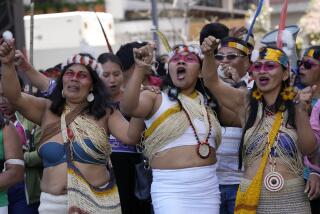OPEC Session Ends; Little Progress Seen : Pullout by Ecuador Averted; No Decision on Production, Prices
- Share via
VIENNA — Two days of wrangling over prices and production quotas ended Friday with little agreement except that the 13 members of the Organization of Petroleum Exporting Countries will meet again in Geneva on Dec. 6.
For a time it looked as though one of the founding members would drop out of the 25-year-old organization. Ecuador failed to attend meetings Thursday evening and Friday. Fernando Santol Alvite, the Ecuadorean delegate, said that, unless his country was granted a higher production quota, it would prefer to go it alone.
But by the time the meeting ended Friday afternoon, the OPEC president, Indonesian Oil Minister Subroto, was able to announce that Ecuador would be staying on as a member.
Production Ceiling Maintained
Apart from fixing the December date for another meeting, the delegates decided to continue until then with a production ceiling of 16 million barrels a day. There would have been little point in increasing quotas, since the OPEC countries are currently selling only about 14.6 million barrels a day.
According to estimates of the International Energy Agency in Paris, which is made up of oil consuming industrial nations, world demand will increase in the next few months as the weather turns cold and oil stocks have to be replenished. But by next spring, according to the IEA forecast, demand is not likely to be much higher than it is now.
Thus, the request by Ecuador--and five other OPEC members, Iran, Iraq, Gabon, Qatar and the United Arab Emirates--had no chance of being approved here by the other seven members.
Subroto said: “Either we have to increase the 16-million-barrel-a-day ceiling or someone will have to reduce”--and no one was willing to reduce.
All of the OPEC states are facing balance-of-payment difficulties as a result of falling world oil prices and falling sales, including Saudi Arabia, the principal producer. Since the last OPEC meeting in July, the Saudis have decided to sell their oil at contract discount prices to major companies, among them Aramco and Mobile, and this has had a major effect on OPEC.
Saudi Production Rises
In July, the Saudis were producing barely 2 million barrels a day, though their OPEC quota was 4.3 million barrels a day. Theoretically, this left some slack for other OPEC members to pick up. But now Saudi production is back up to 3.5 million barrels a day, and the Saudi oil minister, Ahmed Zaki Yamani, refused even to discuss any cut in his country’s quota.
Yamani said Friday that, with demand rising, the effect of the Saudi sales at discount prices would not be very strong “in the short term.” Still, it leaves the OPEC price structure vulnerable to market forces--even if prices are relatively firm at present.
“I think there is a change now,” Yamani said. “The last member country that was strictly following OPEC prices was Saudi Arabia. It is changing and following the others.”
Yamani warned that it is up to the entire OPEC membership to hold the line or face a price war.
On Thursday, at the start of the meeting, OPEC issued an appeal to non-member producers such as Mexico, Egypt, Britain and Norway to join them in holding the price line.
In Europe, spot-market oil prices closed 50 cents a barrel lower than Thursday after falling by as much as 90 cents earlier.
Traders said that the market was disconcerted by comments from the leading OPEC ministers as the Vienna meeting ended that special deals undercutting their own official prices could become widespread and that member states were going to turn out oil regardless of output quotas.
More to Read
Sign up for Essential California
The most important California stories and recommendations in your inbox every morning.
You may occasionally receive promotional content from the Los Angeles Times.













